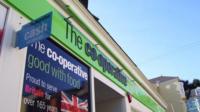
The Co-operative Group has revealed it made a profit of £124m in 2014 compared with a loss of £255m the previous year.
It said its food and funerals business had performed "robustly", with same-store sales in food up 0.4%, but its insurance business had lost money.
The Co-op has begun a three-year plan to steady the business after deep problems emerged in 2013 with its bank, which it has since largely sold off.
In the past year, it has sold its pharmacy chain and farms raising £216m.
Chief executive Richard Pennycock said without the proceeds of the sales the group would have, "at best, broken even".
He said the organisation had made good progress reducing its costs, which had fallen from £176m to £146m and it had also cut its debts from £1.4bn to £808m.
Co-op Group chairman Allan Leighton told the BBC that the business had strayed a long way: 'We lost the heart of what the Co-op was. I mean look at what's happened to the business, it's terrible.
"The Co-op did used to stand for something and it was in the community, membership was important. Co-operation was important, but we've had unco-operation, we should have been called the unco-operative. Because that's the reality of where we've been."
Expansion
The Co-op is the country's largest mutually-owned organisation with more than eight million members, who share in the profits of the business.
It is the UK's fifth-largest food retailer with almost 2,800 stores. In the last year, the group added 82 convenience stores and refurbished more than 700 stores. It plans to expand by adding another 100 outlets this year.
But despite the improving performance, the business warned it would not be paying a dividend to its members until 2018.
Last year, the Co-op recorded a net loss of £2.3bn, once one-off losses relating to its bank and its then-owned Somerfield business were taken into account.
It was forced to divest itself of a large chunk of the bank to a number of private investors, largely hedge funds, and now owns just 20% of that business.
That prompted a review by Lord Myners in which he called the group "manifestly dysfunctional" and recommended a major shake-up in its organisational structure.
Politics
Co-op members will also get the chance to vote on whether the group should continue to make donations to political parties.
BBC business editor Kamal Ahmed says that in effect, the board is asking the members of the Co-operative Group whether they want to continue financially supporting the Co-operative Party.
The Co-op Party includes among its members a number of prominent Labour MPs such as Ed Balls, Stella Creasy and Chris Leslie. They stand as candidates of both the Co-operative Party and the Labour Party.
Our business editor points out that the board has "carefully not given a view. But it is interesting to note that the new Co-op chairman, Allan Leighton, did sign a letter backing Labour in 2001".
Anda sedang membaca artikel tentang
Co-operative Group returns to profit
Dengan url
http://beritaberbagiceria.blogspot.com/2015/04/co-operative-group-returns-to-profit.html
Anda boleh menyebar luaskannya atau mengcopy paste-nya
Co-operative Group returns to profit
namun jangan lupa untuk meletakkan link
Co-operative Group returns to profit
sebagai sumbernya
0 komentar:
Posting Komentar